From Thatcher to May: UK's 'shady relations' with UAE's authoritarian rulers are nothing new
The documents show that, in 1985, the UK and UAE government tried to punish the editor of a London-based Arab newspaper for offending Abu Dhabi's authoritarian rulers.
The content of the article by al-Sharq al-Jadid (The New Orient) is not mentioned in the UK government correspondence and sections of the documents have been blanked out on government orders.
However, The New Arab has uncovered a copy of the magazine from September 1985. It states that a then adviser to Crown Prince Sheikh Khalifa bin Zayed Al Nahyan was the lover of a young Abu Dhabi princess.
 |
The New Arab has uncovered a copy of the magazine from September 1985. It states that a then adviser to crown prince Sheikh Khalifa was the lover of a young Abu Dhabi princess |  |
This princess was married then, as she is now, to a powerful and wealthy older member of the Abu Dhabi ruling family. Both the princess and her husband are relatives of Sheikh Khalifa, who is now the UAE's ageing ruler (his younger brother Mohammed bin Zayed or MBZ is widely acknowledged to be the real power behind the throne). The New Arab is not naming the individuals for legal reasons.
The article's publication seems to have gone unnoticed in the British press but the UAE government still put heavy pressure on their British counterparts to punish the editor responsible for printing it.
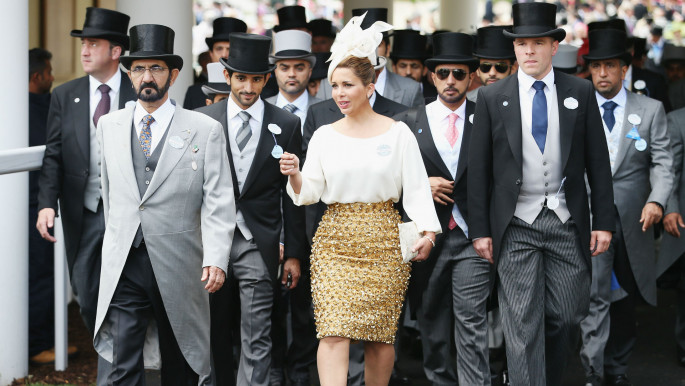 |
|
| Read also: Runaway royal: Dubai ruler's wife Princess Haya 'seeks refuge in London' after fleeing 'abusive husband' |
In the same month it was published, Sheikh Khalifa, who is now the UAE's President, sent a messenger called Colonel Zaid Hilal to Downing Street to ask what the UK government were going to do about the publication.
British Prime Minister Margaret Thatcher replied to Khalifa in a letter expressing her "deep regret and concern at the offence which these unpleasant allegations have caused to His Highness the President and other members of your family".
She continued: "I have instructed the appropriate authorities to examine all possible avenues open to us under our existing law…[this] must not be allowed to mar the excellent relations between our two countries."
In a similar tone, Home Secretary Douglas Hurd wrote to the husband whose wife was accused of having a lover. He apologised for having to discuss a subject so "disagreeable" and said he "deeply regret that that should have happened and [has] examined the measures open to you and to us to deal with it". He added that he and his colleagues were looking at different possibilities for action.
"There is no lack of will to be helpful on our part, but one consideration which weighs heavily with is that if we adopt any procedure which is then publicly resisted or challenged in our courts of law, then the result might be further and much wider publicity of the kind which you so understandably resent."
A letter from the Foreign Office to Thatcher's office shows what some of these "possibilities for action" were. In the letter, Foreign Office civil servant Colin Budd says that the department has looked into "taking action either to shut the broadsheet down or remove the editor from the UK".
 |
British Prime Minister Margaret Thatcher replied to Khalifa in a letter expressing her 'deep regret and concern at the offence which these unpleasant allegations have caused to His Highness the President and other members of your family' |  |
While Budd said neither of these things seemed to be legally possible, he said "we look forward to hearing more on this latter point [deportation] from the Home Office".
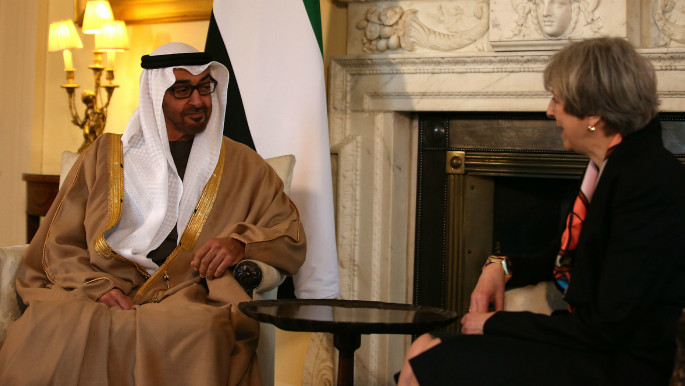 |
|
| Read also: Britain must speak up on UAE's human rights violations |
Pressure from the UAE government for the editor to be deported remained high. In a meeting between the husband and backbench Tory MP Julian Amery, the husband passed on a message from Sheikh Zayed to Margaret Thatcher.
In this message, as reported by Amery, Zayed says he is "deeply grateful" to Thatcher for the "personal interest" she has shown "in the problem presented by the publication in London of the slanderous Arabic journal."
Amery adds that the husband himself was "very pleased" with the outcome of his meeting with Douglas Hurd and that the husband "looks forward to co-operating with our people to find out exactly what is behind the slanderous journal and trusts that we shall find valid grounds for removing its editor from Britain".
In the end though, the correspondence implies that the UK government could not find a way to legally deport the editor.
According a confidential report, a UK government representative named Mr Renton met Sheikh Zayed. Renton "expressed his regret to [the husband] that articles offensive to the ruling family were being published in London and explained why it was difficult for [the UK government] to act against the publisher".
 |
Pressure from the UAE government for the editor to be deported remained high |  |
The husband replied that "he knew that the Prime Minister and the Home Secretary had done all they could. Al-Sharq al-Jadid should not be an obstacle to good relations with Britain. His only regret was that the British authorities had not felt able to exchange information about the publisher with the UAE's security service." According to the report, Renton "underlined the legal and political difficulties" of that.
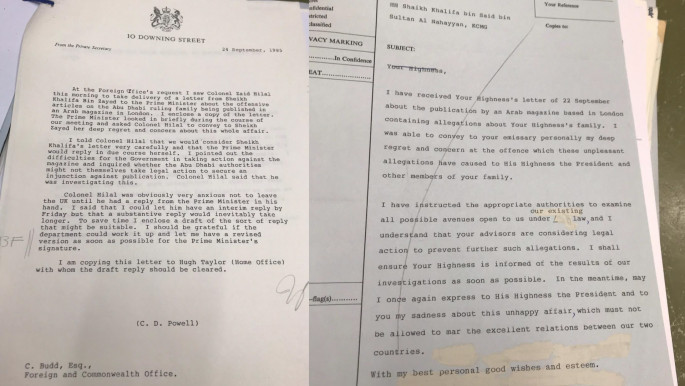 |
|
| Documents showing the conversations between UK and UAE officials seen by The New Arab from The National Archives |
The 'excellent relations' between UK-UAE
The princess, her husband and her alleged lover all remain rich and powerful members of the Abu Dhabi elite.
Commenting on these revelations, Rebecca Vincent, UK bureau director of Reporters Sans Frontieres (RSF) said: "This is a very worrying historical example of the UK prioritising other interests at the expense of press freedom, and unfortunately we still do not always get it right.
"The UK plays an important international standard-setting role when it comes to press freedom, and our government should not only ensure that journalists are able to report freely from the UK, but act to hold governments like the UAE accountable for their behaviour within their own borders too."
A spokesperson for the International Campaign for Freedom in the UAE added: "These revelations demonstrate that not much has changed when it comes to the UK's shady relations with the UAE. History shows that time and time again, the British government has prioritised lucrative trade deals with the Gulf state over human rights concerns. This often entails helping the Emirati regime in their PR management.
 |
This is a very worrying historical example of the UK prioritising other interests at the expense of press freedom, and unfortunately we still do not always get it right |  |
"As the smooth running of relations between the two countries relies on garnering as little public scrutiny as possible, it's not in either parties' interest for negative stories to come to light."
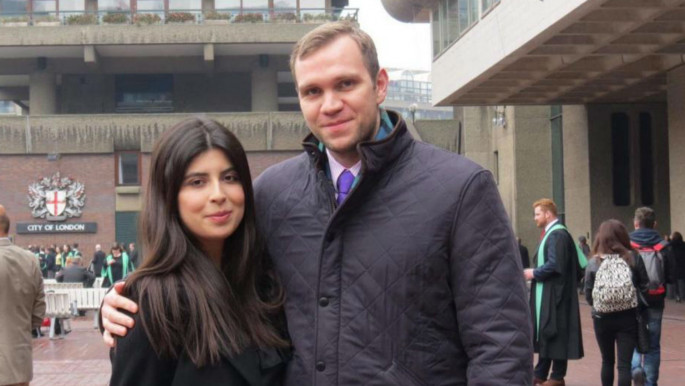 |
|
| Read also: As the UAE's authoritarianism grows, Western governments remain silent |
In 2015, The Mail on Sunday revealed how the UAE funded a secretive network linking powerful figures in Britain and the Gulf, which included some of former British prime minister David Cameron's closest lieutenants, and how it sought to mould UK policy to suit its own political ambitions at the expense of its Middle East rivals.
According to the paper, the network targeted top British newspapers and journalists and claimed credit for published articles attacking Qatar, as well as mounting a diplomatic offensive that persuaded Cameron to order a surprise 'review' into the Muslim Brotherhood.
Leaked documents also revealed that the UAE's rulers pursued their goals by signing a six-year, £60,000-a-month contract with London political lobbying firm Quiller Consultants, part-owned by Lord Chadlington, the Conservative branch chairman in Cameron's constituency of Witney, Oxfordshire. According to the contract, the job of Quiller was "to promote and achieve the foreign policy objectives of the UAE", and that "all the activities as part of this engagement will be carried out in strict confidence."
An appalling human rights record
Today, the United Arab Emirates government continues to have a poor record on not only press freedom, but also on human rights.
Since 2011, the UAE has carried out a sustained assault on freedom of expression, arbitrarily detaining peaceful critics, political dissidents, rights activists and academics, with enforced disappearances, torture and ill-treatment commonplace.
Yet ironically, earlier this year the UAE declared 2019 as 'The Year of Tolerance'.
"Despite its assertions about tolerance, the UAE government has demonstrated no real interest in improving its human rights record," Sarah Leah Whitson, Middle East and North Africa director at Human Rights Watch, said earlier this year.
One human rights activist, Ahmed Mansoor, was jailed in 2017 for ten years after criticising the government on social media. In the weeks leading up to his arrest he had criticised the imprisonment of other activists in the UAE and had used social media to draw attention to rights violations committed in the Yemen war by the Saudi-led coalition, of which the UAE is a key member.
Furthermore in 2017, following the blockade on Qatar – where Saudi Arabia, the UAE, Bahrain and Egypt cut all ties with Doha, closing its only land border, banning planes from their airspace and barring Qatari nationals from passing through their airports – the UAE issued a law banning people from publishing any expressions of sympathy towards Qatar, stating that it will "punish offenders" with a jail term of up to 15 years and a fine of around $136,000.
Read more here: Qatar blockade: Severed brotherhood, unshaken defiance
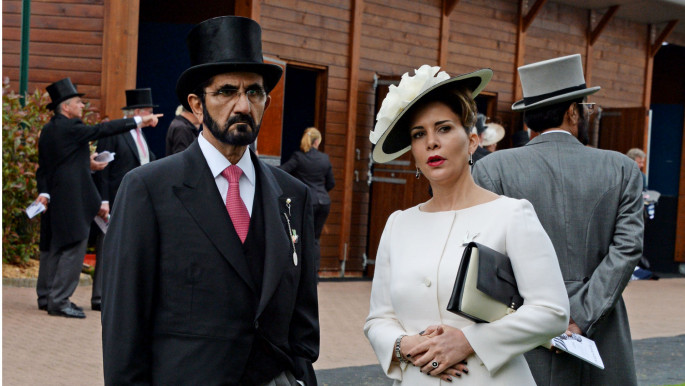 |
|
| Read also: 'I don't care if you die': Dubai ruler slams runaway wife in Instagram poem |
With bilateral trade set to increase when Britain leaves the EU, it's hard to see how this settlement will change in the near future.
Nicholas Gilby, author of Deception in High Places, said these documents show that the UAE was one of a number of Gulf states which at that time strongly lobbied the British government to influence UK media coverage on their behalf.
In 1980, he said, Saudi Arabia expelled the UK Ambassador because of a UK-made documentary called Death of a Princess which reported that 19-year-old Princess Mishaal and her lover had been publicly executed for adultery.
The documents also come as reports are being investigated that Princess Haya, the wife of Dubai’s ruler Sheikh Mohammed bin Rashid Al Maktoum has fled the Emirates and applied for asylum in the UK. On Friday, Legal advocacy group Detained in Dubai said Princess Haya had fled her abusive husband and the princess is "believed to be concerned about her personal safety in the UK". The Emiratis have allegedly made private requests to return the runaway royal to the UAE, though the UK's Foreign Office is dealing with the case as a private dispute.
Various reports over recent years point to the extent of torture and human rights abuses in the wealthy Gulf kingdom. Women from neighbouring Saudi Arabia have been making high-profile appeals for asylum in recent months, the latest being sisters Dua and Dalal who fled to Turkey earlier this month after escaping alleged rape, forced marriage and abuse from their relatives.
Joe Lo is a freelance journalist based in London.
Follow him on Twitter: @joeloyo







